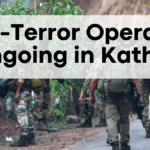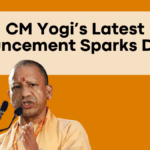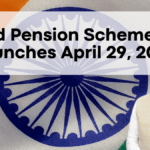The Indian government’s decision to potentially lift the National Security Act (NSA) imposed on Papalpreet Singh has garnered significant attention. Papalpreet Singh, an individual closely associated with pro-Khalistan activities, has been in the spotlight for his involvement in various cases related to national security. This move to revoke the NSA and facilitate his return to Punjab is likely to trigger debates on security, justice, and political ramifications, especially in the context of Punjab’s ongoing political dynamics.
Table of Contents
Govt Plans to Lift NSA on Papalpreet Singh
Key Point |
Details |
|---|---|
Papalpreet Singh’s Role |
Involved in pro-Khalistan activities and linked to various security cases. |
NSA |
The NSA was imposed on Papalpreet Singh for activities deemed as a threat to national security. |
Government’s Decision |
The Indian government is planning to lift the NSA on Papalpreet Singh. |
Return to Punjab |
Papalpreet Singh is expected to return to Punjab following the revocation of the NSA. |
Political Repercussions |
The move is expected to have significant political implications in Punjab, especially among pro-Khalistan groups. |
Official Statement |
No formal confirmation on the exact date of revocation, but government officials have hinted at it. |
Background on Papalpreet Singh
Papalpreet Singh’s involvement in the Khalistani movement has been a matter of national concern for several years. He has been accused of promoting separatist agendas and was allegedly connected to the rise of militancy in Punjab. The Indian government imposed the NSA on him under provisions that allow for preventive detention without trial, primarily to curb activities that pose a threat to national security.
Despite his detention, Singh’s influence in certain circles remained significant. His supporters argue that his detention under NSA was politically motivated, while critics claim that his activities continue to be a risk to the peace and stability in Punjab.
The National Security Act (NSA)
The NSA is a preventive detention law that allows the Indian government to detain individuals without trial if their actions are deemed harmful to the nation’s security. This law has been controversial in many cases, with critics arguing that it often infringes on individual rights. However, in Singh’s case, it was invoked due to his alleged involvement in anti-national activities, particularly those linked to the Khalistani movement.
Government’s Plan to Lift NSA
Government officials have recently indicated that they are considering lifting the NSA on Papalpreet Singh. This decision is seen as a step toward defusing rising tensions around the pro-Khalistan movement and to bring Singh back to Punjab. Some believe this move could be part of broader efforts to address Punjab’s political landscape, where separatist rhetoric continues to find resonance among certain sections of society.
However, this move is not without controversy. While some view it as a path to bring peace and closure to ongoing political disputes, others believe that it could embolden separatist elements within the region. The Indian government is likely to take these factors into account as it finalizes its decision.
Expected Return to Punjab
Once the NSA is lifted, Papalpreet Singh is expected to return to Punjab, where his presence may further fuel political debates. The return could be seen as a symbol of the Indian government’s willingness to engage with controversial political figures in a bid for peace. However, the situation is complex and will require careful management to avoid any resurgence of violence or unrest.
The return of individuals like Singh could influence local elections and stir up debates on the effectiveness of security measures in the region. It remains to be seen how the people of Punjab will react to this development, as political leaders and various factions have different views on the issue.
Political Implications
The decision to lift the NSA on Papalpreet Singh could have profound political implications for the state of Punjab. The region has historically been sensitive to issues of sovereignty and independence, particularly in the context of the Khalistan movement. While some may view Singh’s return as a victory for their cause, others may see it as a threat to the region’s peace and stability.
In Punjab, where political parties often take divergent stands on security and separatism, the revocation of the NSA could be leveraged as a political tool. The state government, opposition parties, and pro-independence groups are all likely to weigh in on the matter. This situation could contribute to the growing polarization in the region, especially as elections loom.
Legal and Security Concerns
The lifting of the NSA on Papalpreet Singh would require a careful assessment of his legal standing and security risks. Legal experts argue that revoking the NSA may be difficult if Singh still poses a threat to national security. At the same time, human rights organizations will likely scrutinize the government’s move to ensure that it is not done arbitrarily or in a manner that violates constitutional rights.
On the security front, there is concern over whether Singh’s return might spark unrest. Given the region’s history, any move seen as a concession to separatist groups could trigger protests or violence. The government will need to monitor the situation closely and respond swiftly to any developments.
FAQ
Q1: Why was NSA imposed on Papalpreet Singh?
The NSA was imposed on Papalpreet Singh due to his alleged involvement in separatist activities that posed a threat to national security. He was associated with pro-Khalistan movements, which have been a concern for national peace and integrity.
Q2: What does lifting the NSA mean for Papalpreet Singh?
Lifting the NSA would allow Papalpreet Singh to return to Punjab without the restrictions imposed under the act. This could signal a shift in the government’s stance on certain political elements in Punjab.
Q3: What are the political implications of this move?
The decision could influence Punjab’s political climate, especially with elections approaching. It may embolden pro-Khalistan groups or be viewed as a political gesture by the Indian government to calm tensions.
Q4: Could this decision lead to unrest in Punjab?
Yes, there is a possibility that Singh’s return could trigger protests or unrest, especially if certain groups perceive it as a step toward legitimizing separatist agendas.
Q5: When will Papalpreet Singh return to Punjab?
While there is no official date for his return, government officials have indicated that it is likely to happen soon after the NSA is lifted.
Click here to learn more





